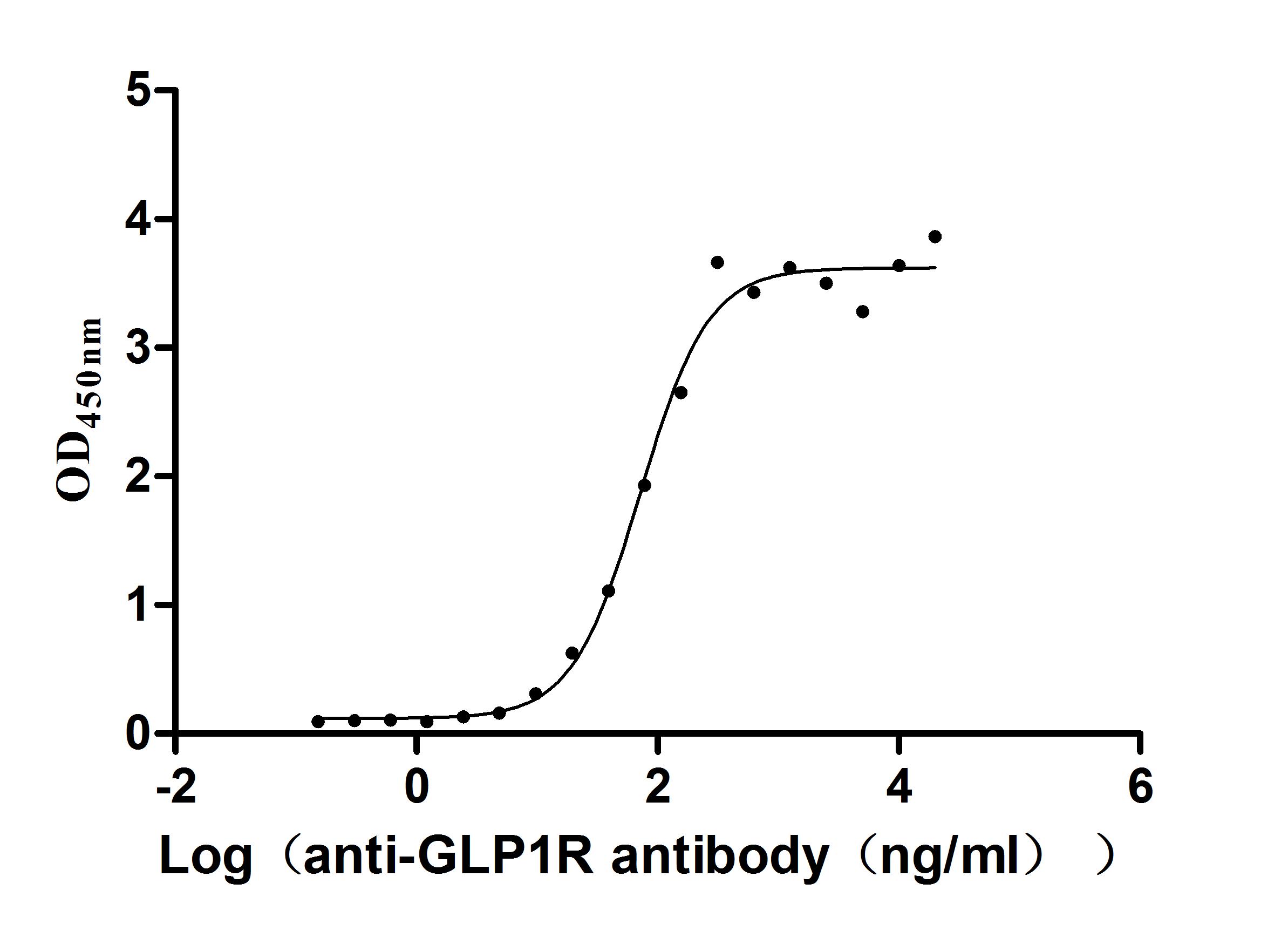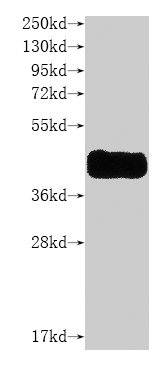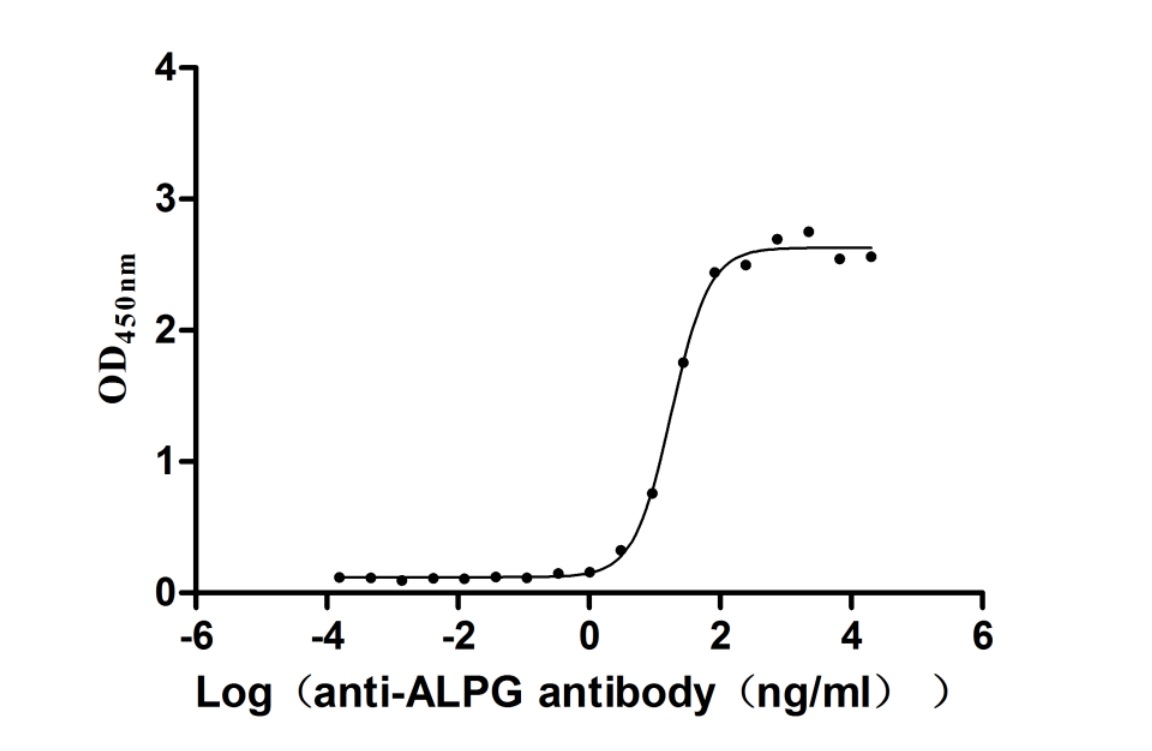Recombinant Mouse Beta-3 adrenergic receptor (Adrb3)
-
货号:CSB-CF001393MO
-
规格:
-
来源:in vitro E.coli expression system
-
其他:
产品详情
-
基因名:
-
Uniprot No.:
-
别名:Adrb3; Adrb3r; B3bar; Beta-3 adrenergic receptor; Beta-3 adrenoreceptor; Beta-3 adrenoceptor
-
种属:Mus musculus (Mouse)
-
蛋白长度:Full length protein
-
表达区域:1-400
-
氨基酸序列MAPWPHRNGSLALWSDAPTLDPSAANTSGLPGVPWAAALAGALLALATVGGNLLVIIAIA RTPRLQTITNVFVTSLAAADLVVGLLVMPPGATLALTGHWPLGETGCELWTSVDVLCVTA SIETLCALAVDRYLAVTNPLRYGTLVTKRRARAAVVLVWIVSAAVSFAPIMSQWWRVGAD AEAQECHSNPRCCSFASNMPYALLSSSVSFYLPLLVMLFVYARVFVVAKRQRHLLRRELG RFSPEESPPSPSRSPSPATGGTPAAPDGVPPCGRRPARLLPLREHRALRTLGLIMGIFSL CWLPFFLANVLRALAGPSLVPSGVFIALNWLGYANSAFNPVIYCRSPDFRDAFRRLLCSY GGRGPEEPRAVTFPASPVEARQSPPLNRFDGYEGARPFPT
Note: The complete sequence including tag sequence, target protein sequence and linker sequence could be provided upon request. -
蛋白标签:N-terminal 10xHis-tagged
-
产品提供形式:Liquid or Lyophilized powder
Note: We will preferentially ship the format that we have in stock, however, if you have any special requirement for the format, please remark your requirement when placing the order, we will prepare according to your demand. -
缓冲液:Lyophilized from Tris/PBS-based buffer, 6% Trehalose, pH 8.0
-
储存条件:Store at -20°C/-80°C upon receipt, aliquoting is necessary for mutiple use. Avoid repeated freeze-thaw cycles.
-
保质期:The shelf life is related to many factors, storage state, buffer ingredients, storage temperature and the stability of the protein itself.
Generally, the shelf life of liquid form is 6 months at -20°C/-80°C. The shelf life of lyophilized form is 12 months at -20°C/-80°C. -
货期:Basically, we can dispatch the products out in 1-3 working days after receiving your orders. Delivery time may differ from different purchasing way or location, please kindly consult your local distributors for specific delivery time.Note: All of our proteins are default shipped with normal blue ice packs, if you request to ship with dry ice, please communicate with us in advance and extra fees will be charged.
-
注意事项:Repeated freezing and thawing is not recommended. Store working aliquots at 4°C for up to one week.
-
Datasheet & COA:Please contact us to get it.
相关产品
靶点详情
-
功能:Beta-adrenergic receptors mediate the catecholamine-induced activation of adenylate cyclase through the action of G proteins. Beta-3 is involved in the regulation of lipolysis and thermogenesis.
-
基因功能参考文献:
- In contrast, Adrb3 activation stimulates mature white adipocytes to convert into beige adipocytes. PMID: 29019320
- Specific visible radiation facilitates lipolysis in mature 3T3-L1 adipocytes via rhodopsin-dependent beta3-adrenergic signaling. PMID: 28483278
- beta3-Adrenergic Regulation of EPC Features Through Manipulation of the Bone Marrow MSC Niche. PMID: 28513874
- Findings are of potential physiologic importance as they uncover the antidiuretic effect of beta3-AR stimulation in the kidney. PMID: 27206969
- aerobic exercise training could improve cardiac systolic function and alleviate LV chamber dilation, cardiac fibrosis and hypertrophy in heart failure mice. The mechanism responsible for the protective effects of aerobic exercise is associated with the activation of the beta3-AR-nNOS-NO pathway. PMID: 28622359
- Data (including data from studies in knockout mice) suggest that Adrb3 is dispensable for browning of adipose tissue; here, no differences was observed in cold-induced thermogenic gene expression in brown, white, or beige adipose tissues due to absence of Adrb3; irrespective of duration of cold exposure or sex of mice, no effect of absence of Adrb3 was observed. PMID: 28223294
- injection of a b3-adrenergic receptor (b3-AR) agonist for continuous 5 days increased the number of Ki67-positive brown adipocytes even at Day 1 but not that of SV cells. In addition, the b3-AR antagonist, but not b1-AR antagonist, attenuated the cold exposure-induced increase in the number of Ki67-positive brown adipocytes PMID: 27846311
- ARbeta3 disruption does not affect brown adipose tissue thermogenesis but increases susceptibility to diet-induced obesity by dampening white adipose tissue lipolytic response to adrenergic stimulation. PMID: 27672060
- RIP140 has a unique role in the acute effect of beta-3 adrenergic receptor activation. PMID: 28322782
- Data show that fish oil intake increased oxygen consumption and rectal temperature, with concomitant upregulation of mitochondrial uncoupling protein 1 (UCP1) and beta3 adrenergic receptor (beta3AR). PMID: 26673120
- ADRB3 in perivascular adipose tissue contributes to vascular function in the progression of hypertension. PMID: 26910302
- Theseresultssuggestthat beta3-adrenoceptors are present in colonic Interstitial Cells of Cajal and may play a role in regulating gastrointestinal motility by the inhibition of pacemaker potentials. PMID: 25725113
- role of beta3-adrenoreceptor in myocardial infarction injury via eNOS and nNOS activation PMID: 24911015
- Nitric oxide is a downstream effector of beta3 adrenergic receptors which modulates melanoma cell proliferation. PMID: 24599317
- A single-dose administration of beta3AR agonist before reperfusion decreased infarct size and resulted in a consistent and long-term improvement in cardiac function in mouse model of myocardial ischemia reperfusion injury. PMID: 24951958
- Data suggest that Adrb3 is involved in regulation of pancreatic islet blood flow; hyperlipidemia (triglycerides and free fatty acids) is associated with vagus nerve-dependent increase in pancreatic/islet blood flow and up-regulation of insulin secretion. PMID: 25139049
- Beta3 adrenergic receptor activation lowers blood lipids and glucose which attenuates atherosclerotic plaque formation. PMID: 23892270
- activation of beta-adrenoceptor reduce the plaque area in the thoracic aorta and play an important anti-atherosclerotic role by regulating lipid metabolism disorders and the SR-B1 signal transduction pathway PMID: 23911886
- Beta3-adrenergic receptors modulate vascular endothelial growth factor release in response to hypoxia through the nitric oxide pathway in mouse retinal explants PMID: 23283573
- expression and function of beta(3)-adrenoceptors and beta(2)-adrenoceptors in mouse uterus PMID: 23219791
- beta(3)-adrenergic stimulation acts through up-regulation of E-selectin in adipose tissue endothelial cells to induce neutrophil infiltration PMID: 23235150
- Results suggest that the effects of zinc-alpha2-glycoprotein (ZAG) on body weight and insulin sensitivity in ob/ob mice are manifested through beta-adrenoreceptor (beta-AR) beta-3AR or possibly a beta2-AR. PMID: 22227600
- Brown adipocytes that are induced by beta3-adrenergic receptor activation in abdominal white adipose tissue arise from the proliferation and differentiation of cells expressing PDGFRalpha, CD34, and Sca-1. PMID: 22482730
- The function of M2 MR is substituted by beta3-AR and that these effects are mediated via adenylyl cyclase rather than NOS. PMID: 22222438
- Diminished beta3AR signaling may be the critical element to explain the direct effects of leptin on the myocardium and suggest that this work reveals a key feature in the role of leptin in obesity-related cardiac hypertrophy and heart failure. PMID: 21772246
- interaction of the beta(3a)-AR with caveolin inhibits coupling to Galpha(i/o) proteins and suggest that signaling is modulated by a raft-enriched complex containing the beta(3a)-AR, caveolin-1, Galpha(s), and adenylyl cyclase. PMID: 22535965
- NT-PGC-1alpha protein is sufficient to link AR beta 3 activation to transcriptional and physiological components of thermogenesis. PMID: 22282499
- High (stress) levels of epinephrine directly compromise the activity of neonatal mouse skin fibroblasts through the activation of beta1-, beta2- and beta3-adrenoceptors, but not through alpha1- and alpha2-adrenoceptors. PMID: 21366703
- b3-adrenoceptors are present in mouse astrocytes and activation of b2- and b3-adrenoceptors increases glucose uptake PMID: 21138422
- negative inotropy and heart hypertrophy occur in total adrenergic beta receptor deficiency PMID: 20406048
- Data show that both the mRNA and protein levels of beta2- and beta3-adrenergic receptors were up-regulated following cAMP/PKA-mediated adipogenesis of mouse bone marrow derived mesenchymal stem cells. PMID: 20363288
- genetic variants, including Ala/Ala of SCYA11 (eotaxin) Ala23Thr, Cys/Cys or Cys/Ser of PON2 (paraoxonase 2) Ser311Cys and Arg/Arg of ADRB3 (beta3-adrenergic receptor) Trp64Arg, were independently associated with incident cardiac end-point. PMID: 20536507
- Data show that caveolin-1 ablation affected neither the G-protein coupled LPA receptor signaling to Erk1/2, nor the receptor tyrosine kinases PDGF- or EGF-receptor signaling to Erk1/2. PMID: 20381543
- Both beta2- and beta3-AR are involved in MSC osteogenesis, with beta2-AR being dominant. PMID: 20138019
- Data suggest that glucocorticoids have opposing effects on beta(3)-adrenergic receptor gene expression: they rapidly and directly inhibit transcription but also induce a rapidly turned-over protein that stimulates gene transcription. PMID: 11997176
- betaAR signaling required for diet-induced thermogenesis and obesity resistance. PMID: 12161655
- role in obesity and cold sensitivity and response to fasting PMID: 12387862
- nuclear BAR-3 may have a role in eating behavior PMID: 12943691
- adrenergic stimulation, through beta3-adrenergic receptors/cAMP/protein kinase A, recruits a PI3K pathway stimulating conventional and novel PKCs, which mediate glucose uptake in brown adipocytes PMID: 14551227
- vimentin plays an essential role in the signal transduction pathway from beta3AR to the activation ERK and its contribution to lipolysis PMID: 17251187
- beta3-AR are upregulated during sepsis in the human myocardium and by cytokines in murine cardiomyocytes, where they mediate an increased negative inotropic response to beta3 agonists. PMID: 17999941
- Here we describe an atypical state of the beta(3)-adrenoceptor that exists endogenously in adipose tissue PMID: 18031735
- Report the effects of beta(3)-adrenoceptor agonist CL-316,243 on adiponectin, adiponectin receptors and tumor necrosis factor-alpha expressions in adipose tissues of obese diabetic KKAy mice. PMID: 18304529
- Norepinephrine signaling via beta(3) adrenergic receptors presumably in brown fat is the first neurotransmitter-receptor system identified that is required for normal recovery from torpor. PMID: 19107190
- while stimulation of the beta(3)AR leads to activation of CRE-dependent transcription, there are several pathways that converge at the level of CRE-response element activation, and for IL-6 this activation is mediated by p38 and PKC but not PKA pathways. PMID: 19477016
- Folic acid consumption has significant modulatory effects on beta-ARs protein expression and lipolysis. PMID: 19596833
- Functional beta(3)-adrenoceptors appear to be present in mouse urinary bladder. PMID: 19619525
- data suggest a cardioprotective role for the beta3-AR in modulating oxidative stress and adverse remodeling in the failing heart. PMID: 19766235
显示更多
收起更多
-
亚细胞定位:Cell membrane; Multi-pass membrane protein.
-
蛋白家族:G-protein coupled receptor 1 family, Adrenergic receptor subfamily, ADRB3 sub-subfamily
-
组织特异性:White and brown adipose tissues, and digestive tract. Isoform B highest in brain.
-
数据库链接:
KEGG: mmu:11556
STRING: 10090.ENSMUSP00000080162
UniGene: Mm.278475
Most popular with customers
-
Recombinant Human IGF-like family receptor 1 (IGFLR1), partial (Active)
Express system: Mammalian cell
Species: Homo sapiens (Human)
-
Recombinant Rabbit Tissue factor pathway inhibitor (TFPI) (Active)
Express system: Mammalian cell
Species: Oryctolagus cuniculus (Rabbit)
-
Recombinant Rat Intestinal-type alkaline phosphatase 1 (Alpi) (Active)
Express system: Mammalian cell
Species: Rattus norvegicus (Rat)
-
Express system: Mammalian cell
Species: Homo sapiens (Human)
-
Recombinant Human Claudin-6 (CLDN6)-VLPs, Fluorescent (Active)
Express system: Mammalian cell
Species: Homo sapiens (Human)
-
Recombinant Human Glucagon-like peptide 1 receptor (GLP1R), partial (Active)
Express system: Mammalian cell
Species: Homo sapiens (Human)
-
Recombinant Human C-C chemokine receptor type 8 (CCR8)-VLPs (Active)
Express system: Mammalian cell
Species: Homo sapiens (Human)
-
Recombinant Human Alkaline phosphatase, germ cell type (ALPG) (Active)
Express system: Mammalian cell
Species: Homo sapiens (Human)


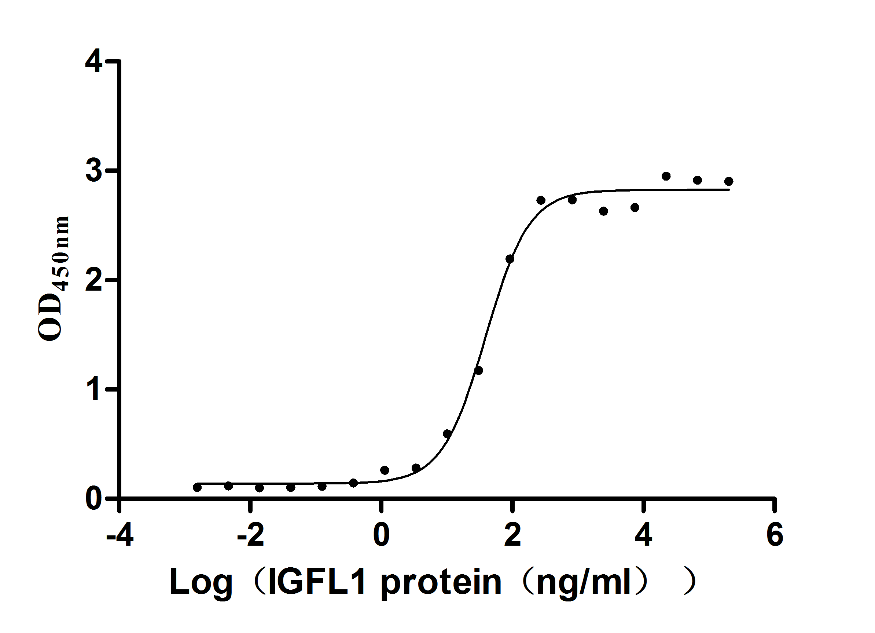
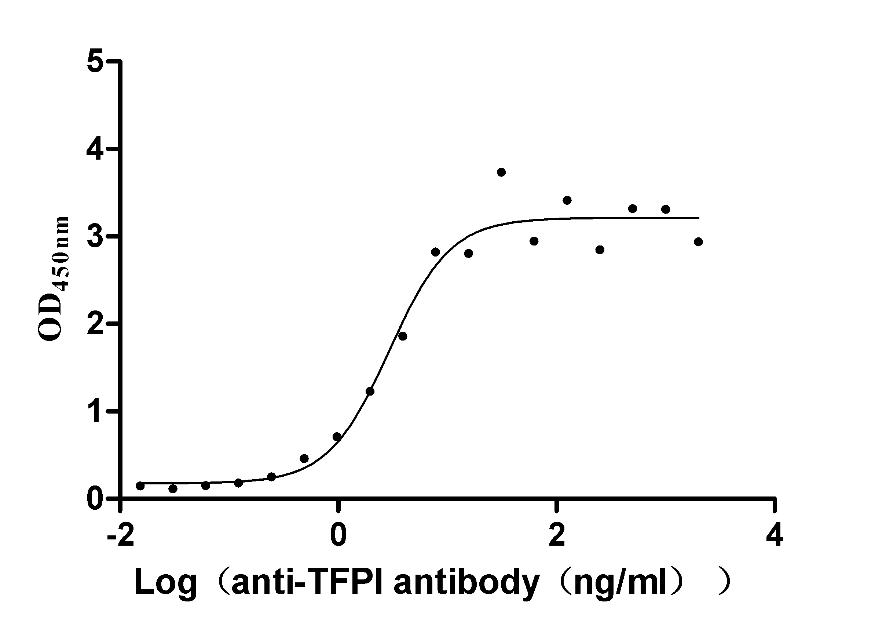

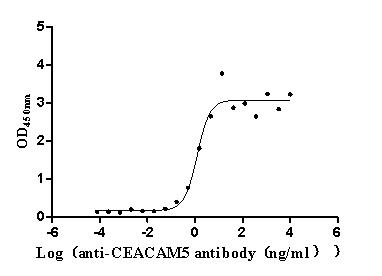
f4-AC1.jpg)
